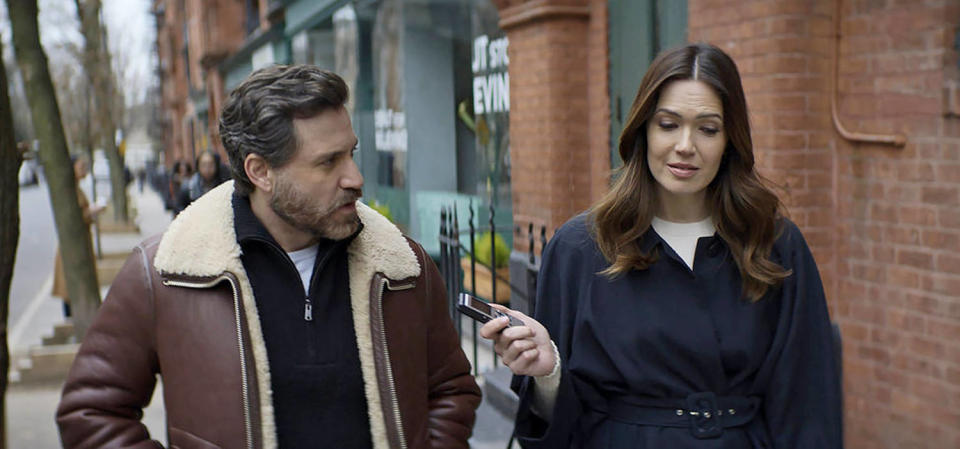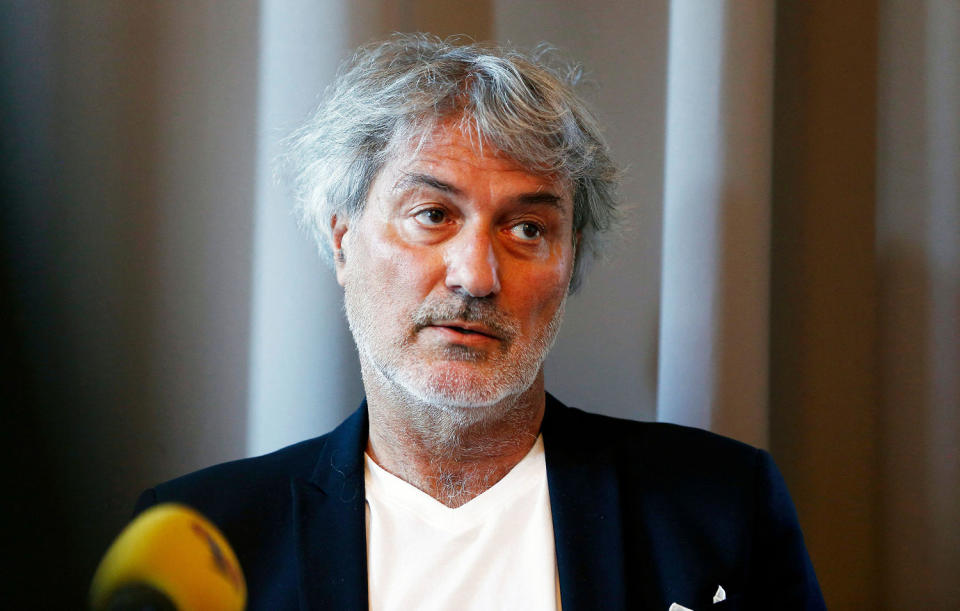Where is Paolo Macchiarini, subject of 'Dr. Death' Season 2, now?

- Oops!Something went wrong.Please try again later.
The second season of “Dr. Death” is out on Peacock Dec. 21, and dives into another story of a doctor and his alleged misconduct.
Season Two explores Dr. Paolo Macchiarini, an Italian thoracic surgeon whose advancements with surgical implants led him to become a leader in regenerative medicine.
That is, until he met then-NBC News producer Benita Alexander, who started asking questions about his cutting-edge techniques — and what he told her about his personal life — after they fell in love.
Mandy Moore, who plays Benita Alexander in “Dr. Death,” tells TODAY.com the show’s second season is based on the Wondery podcast of the same name, which features interviews with Alexander herself. Moore used the podcast to prepare for the role, rather than meet with Alexander.
“The podcast is Benita, in her own words, telling her story. I felt like there was so much to mine from that, so we really just stuck to that,” Moore says. “Because this is such an international story, and it’s been written about and Paolo’s been talked about for over a decade now, there was so much out there for us. It didn’t even feel necessary to try to speak to the real folks.”

Moore says she hopes the show reminds people that the question is not how Alexander fell for Macchiarini, but, “How could somebody like Paulo exist and use whatever that skill set is to wreak such havoc on people’s lives?”
“I hope Benita herself was able to watch (the show) and feel empowered for sharing her story and recognize like she’s not an anomaly. Hopefully it’s starting to destigmatize the idea of what it means to be victims,” Moore says. “It could happen to any of us if it could happen to her.”
Read on for the true story behind Season Two of “Dr. Death,” now streaming on Peacock. (Peacock is owned by NBCUniversal, TODAY’s parent company.)
Who is Paolo Macchiarini?

Macchiarini, 65, is an Italian doctor who rose to fame in the medical community due to his innovative techniques using tracheas from deceased donors. He is credited with performing the first synthetic organ transplant in 2011, according to Vanity Fair, which appeared to solve the problems of organ rejection and a lack of donor organs.
"He was called the 'super-surgeon' and was at the forefront of an exciting field that involves growing new body parts in the lab," Alexander wrote in an article for The Daily Beast in 2018. "He was lauded by some of the world’s top scientists, doctors and institutions, he’d published in the most esteemed medical journals and he worked at the Karolinska Institute, the place that awards the Nobel Prize in medicine."
Macchiarini implanted artificial windpipes in at least eight patients between 2011 and 2014, according to Science. All but one died, and the one patient that did not die had the implant removed, according to Science.
How did Paolo Macchiarini and Benita Alexander meet?
Alexander began working as a producer on the two-hour NBC special "A Leap of Faith" in 2013, which reported on Macchiarini's work, she wrote in The Daily Beast. (The special has since been removed from NBCNews.com.)
After meeting Macchiarini and working on the special, Alexander wrote she "fell madly in love" with the doctor, and that he proposed and wanted to have a wedding in the Italian countryside, according to her account in The Daily Beast.
Macchiarini told her he wanted some of his alleged high-profile patients like Barack Obama to attend, and that his private patient Pope Francis wanted to officiate the wedding, Alexander said.
But six weeks before the big day, Alexander said she found out it was all a lie. According to Vanity Fair, Alexander received an email from a friend that included a link to an article stating the Pope would be traveling in South America on the same day he was supposed to be officiating her wedding.
Macchiarini told Alexander the scheduling was a mix-up due to “Vatican politics,” and that he would travel to Rome to ensure the wedding would turn out as planned, Vanity Fair reported.
Alexander hired a private investigator, who found Macchiarini lied about most details about the wedding, according to Vanity Fair. Father Federico Lombardi, director of the Holy See’s press office, told Vanity Fair in a statement: “There is no ‘personal doctor’ of the Pope with (the) name ‘Macchiarini.’ The Pope has surely never promised to officiate a wedding of ‘Macchiarini’ and does not know someone with such (a) name. On 11th July the Pope was travelling in Latin America and this was on his agenda long time before July … This is enough.”
Macchiarini also was still married to his wife of 30 years, Vanity Fair reported, citing Italian public records. Alexander then had to tell her 300 guests that the wedding was canceled.
"I had given up everything for him, quitting my job and pulling my daughter out of her private school so we could move to his house in Barcelona," she wrote in The Daily Beast. "My friends and family lost the thousands of dollars they’d spent on travel to Italy and fancy red-carpet attire. All for a bogus fantasy wedding."
It was then that Alexander decided she would tell her story, and investigate Macchiarini's medical advancements, because "if he was lying to me on such an egregious level, Paolo was most likely also lying in his medical life," she said.
What happened to Paolo Macchiarini and where is he now?
Four of Macchiarini’s colleagues at the Karolinska Institute filed official complaints against him in 2014, alleging he wrote papers that deliberately left out serious complications that arose in his transplant patients, according to the Karolinska Institute.
The institute commissioned an external investigation in 2014 from Bengt Gerdin, professor emeritus at Uppsala University, to probe the allegations. In 2015, Gerdin’s report concluded Macchiarini was guilty of misconduct in research.
Motnhs later, the institute said in its clearing of Macchiarini at the time that the doctor was not guilty of scientific misconduct, but that his research failed to meet its standards of quality.
Karolinska Institute’s university board launched another investigation into the institute’s handling of the entire case in 2016, this time led by attorney Sten Heckscher, following reports about Macchiarini from Swedish broadcaster SVT and Vanity Fair.
Macchiarini was fired from the Karolinska Institute in 2016, and in 2018, the institute released the findings from the second investigation, which concluded the doctor had committed misconduct, according to the Karolinska Institute.
In 2017, Swedish authorities criminally charged Macchiarini with manslaughter after three of his patients died following their treatments in the Scandinavian country, according to Science. Prosecutors dropped the case months later after they said they did not have enough evidence.
The case was reopened in 2020, and the case was tried in Swedish court in 2022, according to Science. He was convicted of one felony count of “causing bodily harm,” and acquitted of two other charges, according to Science.
Macchiarini received a suspended sentence, but a Swedish appeals court ruled in June to increase the sentence to two-and-a-half years in jail, according to the Associated Press.
Macchiarini has denied any criminal wrongdoing, and his attorney Bjorn Hurtig said he would appeal the ruling, according to the AP.
This article was originally published on TODAY.com

